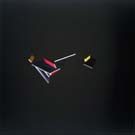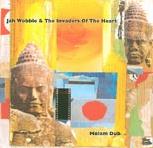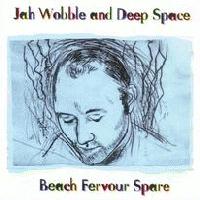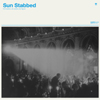- Administrator
- Albums and Singles
 Marc Hellner's long-running synthpop/art ensemble is back from their lengthy hiatus and they have made some significant changes. For one, new vocalist Chanel Pease has joined the fold. Also, Hellner has chosen to largely or completely eschew software use, opting to whole-heartedly embrace the fabled and elusive analog sound that I hear so much about. Regardless of how it was made, Charade is Gold boasts some great singles that easily hold their own against the rest of current wave of synthpop devotees.
Marc Hellner's long-running synthpop/art ensemble is back from their lengthy hiatus and they have made some significant changes. For one, new vocalist Chanel Pease has joined the fold. Also, Hellner has chosen to largely or completely eschew software use, opting to whole-heartedly embrace the fabled and elusive analog sound that I hear so much about. Regardless of how it was made, Charade is Gold boasts some great singles that easily hold their own against the rest of current wave of synthpop devotees.
Given his recent purist bent regarding synthpop's instrumentation, it is no surprise that Hellner also unfailingly nails all of the genre's tropes: politely danceable mid-paced drum machine beats, throbbing synth bass lines, delay-heavy guitars, warm washes and omnipresent shimmer, and a healthy devotion to packing his songs with hooks.Still, this album doesn't sound as completely rooted in the '80s as it might have.The biggest difference, to my ears, is that the vocals are understated and introspective in a way that did not come into vogue until much later.Despite the instrumentation and probable intent, these songs share much more aesthetically with Sarah/Shinkansen bands like Trembling Blue Stars than, say, Soft Cell.That is both a good thing and a bad thing.The good part is that Pulseprogramming completely avoid all of the ostentation and terrible lyrics that typified much of the genre's extroverted salad days.The downside, unfortunately, is that Marc and Chanel both lack the presence and oversized personality necessary to make the leap from "pretty good synthpop band" to "great synthpop band."Which is, of course, a bit frustrating and unfair: even though Pulseprogramming essentially do everything right and have an impressive talent for songwriting, shy and hushed songs will never be as exciting for me as more personality-driven projects (The Knife, Cold Cave, etc.) even if the songs are at the same level (or better).Marc Hellner is just not an in-your-face guy.
That is not only flaw here though, as Pulseprogramming are a bit too fixated on one type of song: everything here has roughly the same pace and the mood seems limited to the very small range between wistful and melancholy.Consequently, the nine songs blur together in an album-sized dose.Of course, album-sized doses may be largely anathema to the genre, as I can't think of many times when I have wanted to experience 40 straight minutes of The Human League or OMD.
Synthpop is a singles game and synthpop albums are meant to be harvested for their best moments.Charade is Gold, for its part, offers three killers in a row near the end of the album."Island Answer Anywhere" is one of the most bouyant and elegantly melodic pieces on the album, but also features some beautifully ghostly, glistening sounds in background."You Mean by Magic," on the other hand, combines Pease's appealing breathy vocals with fun bloopy synth riffing and lush swells that would have made Disintegration-era Robert Smith a bit jealous.The oddly titled "So Right Words Strike Me" is my clear favorite, however, as Marc keeps tossing out one great idea after another (haunting synth washes, burbling hooks, quirky percussion) until he has assembled a small pop masterpiece of textural variety and inspired arrangement. The rest of the album isn't bad by any means, but a lot of it sounds a bit listless and forgettable compared to such striking highlights (though the Pease-centric first single "First They Fire" is likeable, if a bit slight).
When Hellner counterbalances his melancholia and tendency towards understatement with the right amount of energy and catchiness, the results are pretty damn infectious.
Samples:
 
Read More
- Administrator
- Albums and Singles
 You know how it is, when you experience something so wonderful andsublime, you just need to tell the world about it? Well, since I can't tellthe world, I can at least post it to a group of people who may get somethingout of it.
You know how it is, when you experience something so wonderful andsublime, you just need to tell the world about it? Well, since I can't tellthe world, I can at least post it to a group of people who may get somethingout of it.I've just picked up the newest CD by Nits, a group from the Netherlandswho—in my opinion—bear more than a passing relation to the LegendaryPink Dots. For over 20 years they've been releasing a steady stream ofalbums, each one different from the last, and each one worthwhile in its ownway. When you pick up a Nits album, you never know what you're going tohear. While some of the tracks are invariably throw-aways, most of themare brilliant, heart-wrenching, sweet and catchy.
Here's how I see it: if you take the curious poetry of Edward Ka-Spel andLeonard Cohen, the varied instrumentation of the Dots, pass it through asort of "Minimalism Filter," add the painful sincerity of The Red HousePainters, throw in influences from all over the world and a big heaping messof The Beatles and you get something approaching Nits.
Their newest album, "Wool," follows up "Alankomaat" as ashockingly melancholy and wistful CD. Most of the tracks are slow, jazzypieces (aided by the ZAPP! String Quartet and The Stylus Horns). HenkHofstede's lyrics are, as usual, oblique and observational, but—inkeeping with the recent trends in his music—almost crushingly sad anduncertain. A singer named Leona Philippo sings backup on most of the songs,and I hope that she becomes a permanent Nits member. She swings betweensoulful vocals and a kind of angelic, crystalline sadness. Arwen & Laetitiaare wonderful additions to the group, Arwen's bass helping the noir-jazzsound along.
There are moments of atypical Nits experimentation here as well: the odd,timestretched vocal bridge in "26 A (Clouds In The Sky)," the weird whisperypercussion of "The 'Darling' Stone," the analog "space" noises throughout"Seven Green Parrots," and the absolute croaky weirdness of "Frog," the onlyupbeat track on the CD (reminiscent of the earlier Nits track, "Orange,"which helped to defuse the sad loneliness of another album).
I'm not saying that everybody who likes the Pink Dots is going to likeNits—far from it, probably. But if you see "Wool" at a listening stationsomewhere, or you can convince your record store to play it for you, give"Clouds In The Sky," "Crime & Punishment" or "Strawberry Girl" achance...but beware. While buying up releases by Nits is not nearly soarduous as buying up LPDs, it's still quite a chore, and, in my opinion,equally necessary for my mental health.
And if you're flirted with Nits over the years and haven't decidedwhetherto buy this new one or not, I can't gush enough about how this is myfavourite Nits album so far (excluding the double-live "Urk," maybe).It's cohesive, perfectly &clearly produced, and every song is essential. Not to mention thepackagingis a work of art. Quite an accomplisment for a band known for theirpackaging. Nits website is at www.nits.nl.
Read More
- Administrator
- Albums and Singles
 The folks over at 4ADhave the weight of two-decade legacy to bear, and Magnétophone is oneof the first new acts to the 4AD roster in years. This Frenchelectronic duo seems to float at the surface in the sea ofelectronicians who merge beats with minimalistic motives. Their firstfew releases consist of a few tape-only's and some 7" singles throughEarworm. This disc here is their debut full-lengther for the 4AD, butit leaves me wondering what the label's motives are for a group likethis. Are enough people paying attention to 4AD these days to getexcited over something that 4AD has never ventured with? I ask thisquestion because in the 80s, people all over the world would pick upanything from 4AD. Another thing I wonder about is if electronic musiclike this is commercially viable enough to warrant 4AD's tendencies togo overboard with packaging and artwork? The CD itself is beautifullypackaged, including a thin scrap of metal, cut in the shape of aMagnetophone logo and a back which half exposes the CD itself. Overall,I'm impressed as the music refuses to get the least bit boring oroverly repetitive. The disc almost sneaks into the genre of the currentelectronic trendy scenester type stuff, but brings with it a muchgreater variety in sounds. There's truly a wealth of sources used inthe creation of this disc. Absent from this disc is the recent trendfrom many to include dub elements. The music is subdued enough to holdyour adoration and punchy enough in spots to keep you awake. In mostparts, it's somewhat improvisational sounding, leading me to believethat a well-practiced live show would be something special to see. Thesongs themselves are rather sophomoric in terms of structure andcomposition, haphazardly tossing in samples and gated effects, almostto avoid boredom - grooves start and diversions are tossed in to breakany sense of monotony. The sounds themselves are matured andwell-defined enough to make me interested in the group to wonder wherethey're going next.
The folks over at 4ADhave the weight of two-decade legacy to bear, and Magnétophone is oneof the first new acts to the 4AD roster in years. This Frenchelectronic duo seems to float at the surface in the sea ofelectronicians who merge beats with minimalistic motives. Their firstfew releases consist of a few tape-only's and some 7" singles throughEarworm. This disc here is their debut full-lengther for the 4AD, butit leaves me wondering what the label's motives are for a group likethis. Are enough people paying attention to 4AD these days to getexcited over something that 4AD has never ventured with? I ask thisquestion because in the 80s, people all over the world would pick upanything from 4AD. Another thing I wonder about is if electronic musiclike this is commercially viable enough to warrant 4AD's tendencies togo overboard with packaging and artwork? The CD itself is beautifullypackaged, including a thin scrap of metal, cut in the shape of aMagnetophone logo and a back which half exposes the CD itself. Overall,I'm impressed as the music refuses to get the least bit boring oroverly repetitive. The disc almost sneaks into the genre of the currentelectronic trendy scenester type stuff, but brings with it a muchgreater variety in sounds. There's truly a wealth of sources used inthe creation of this disc. Absent from this disc is the recent trendfrom many to include dub elements. The music is subdued enough to holdyour adoration and punchy enough in spots to keep you awake. In mostparts, it's somewhat improvisational sounding, leading me to believethat a well-practiced live show would be something special to see. Thesongs themselves are rather sophomoric in terms of structure andcomposition, haphazardly tossing in samples and gated effects, almostto avoid boredom - grooves start and diversions are tossed in to breakany sense of monotony. The sounds themselves are matured andwell-defined enough to make me interested in the group to wonder wherethey're going next.samples:
Read More
- Administrator
- Albums and Singles
 Fans of Stars of the Lidand Labradford need not be surprised as this album truly sounds likewhat a collaboration between the two groups would sound like. AdamWiltze from Stars has provided his lush soundscapes of symphonicmajesty while Bobby Donne of Labradford brings to the table echoingresonant guitar melodies and even the rare subtle vocals. This discbrings into perspective that Labradford wouldn't be the same withoutall three elements. Mark Nelson's Pan American project coupled with thelive experience of seeing Carter trigger pulses and noises whileplaying the keyboards pretty much completes the puzzle (if you wouldconsdier it a puzzle to begin with!). Aix Em Kelmm is quiet but notwithout forward motion, and growing to be one of my more favoritealbums of the year. Like most music from either camp, it's a charminglisten late at night and a solid record that would easily be able tointroduce fans from either band to the other side.
Fans of Stars of the Lidand Labradford need not be surprised as this album truly sounds likewhat a collaboration between the two groups would sound like. AdamWiltze from Stars has provided his lush soundscapes of symphonicmajesty while Bobby Donne of Labradford brings to the table echoingresonant guitar melodies and even the rare subtle vocals. This discbrings into perspective that Labradford wouldn't be the same withoutall three elements. Mark Nelson's Pan American project coupled with thelive experience of seeing Carter trigger pulses and noises whileplaying the keyboards pretty much completes the puzzle (if you wouldconsdier it a puzzle to begin with!). Aix Em Kelmm is quiet but notwithout forward motion, and growing to be one of my more favoritealbums of the year. Like most music from either camp, it's a charminglisten late at night and a solid record that would easily be able tointroduce fans from either band to the other side.samples:
Read More
- Administrator
- Albums and Singles
samples: "Molam Dub" unites the UK's Jah Wobble and friends with the European based Laotian group Molam Lao. Molam is the beloved traditional music of Laos, a competitive courtship ritual based on improvised singing and the khene (a bamboo mouthorgan similar to an accordian/harmonica). It surprised me at first just how well the Laotians complement and mesh with the old school deep dub groove of team Wobble. It sounds and feels completely natural as though the two were always meant to go together.Most tracks feature the sing-song of a single male lead singer who is occasionally joined by the joyous chants and squeals of the rest of the Lao crew. Several songs add tastefully programmed drum loops and dub mixing techniques, the original "Saravane" is entirely instrumental with intricate string and wind instrument jamming and "Lam Long" lets us hear a few minutes of just Molam (which, I admit, these Western tuned ears finds a bit grating by itself). The final 2 tracks - a 'dance' mix and "Hill Music", the latter composed solely by Wobble's unit - are thankfully not tacky add-ons and fit in just fine with the rest of the album. I'm very impressed with and frankly amazed by "Molam Dub" as I feared nearly 70 minutes of native singing would be too difficult a listen. The performances are spirited and sound 'real' throughout, it's always interesting and it simply gives you all the groove you'd want from a classic dub record, only with more of an international flavor ...
"Molam Dub" unites the UK's Jah Wobble and friends with the European based Laotian group Molam Lao. Molam is the beloved traditional music of Laos, a competitive courtship ritual based on improvised singing and the khene (a bamboo mouthorgan similar to an accordian/harmonica). It surprised me at first just how well the Laotians complement and mesh with the old school deep dub groove of team Wobble. It sounds and feels completely natural as though the two were always meant to go together.Most tracks feature the sing-song of a single male lead singer who is occasionally joined by the joyous chants and squeals of the rest of the Lao crew. Several songs add tastefully programmed drum loops and dub mixing techniques, the original "Saravane" is entirely instrumental with intricate string and wind instrument jamming and "Lam Long" lets us hear a few minutes of just Molam (which, I admit, these Western tuned ears finds a bit grating by itself). The final 2 tracks - a 'dance' mix and "Hill Music", the latter composed solely by Wobble's unit - are thankfully not tacky add-ons and fit in just fine with the rest of the album. I'm very impressed with and frankly amazed by "Molam Dub" as I feared nearly 70 minutes of native singing would be too difficult a listen. The performances are spirited and sound 'real' throughout, it's always interesting and it simply gives you all the groove you'd want from a classic dub record, only with more of an international flavor ...
Read More
- Administrator
- Albums and Singles
 "Beach Fervour Spare" is the second installment of the deep bass journey begun last year with "Deep Space". This time around the band is minus Bill Laswell and Jaki Leibeziet and plus Mark Sanders - drums, Chris Cookson - guitar and production, Paul Schütze - atmospheres and Marc Angelo Lusardi - production and retains Clive Bell and Jean Pierre Rasle. I don't (yet) have the first album so I can't compare the two cds and bands, but there's no doubt that this unit has played together for some time.
"Beach Fervour Spare" is the second installment of the deep bass journey begun last year with "Deep Space". This time around the band is minus Bill Laswell and Jaki Leibeziet and plus Mark Sanders - drums, Chris Cookson - guitar and production, Paul Schütze - atmospheres and Marc Angelo Lusardi - production and retains Clive Bell and Jean Pierre Rasle. I don't (yet) have the first album so I can't compare the two cds and bands, but there's no doubt that this unit has played together for some time.
Jah's name is at the top of the marquee but there is a definite band concept at work here as each member is part of the instrumental whole. At the heart of each of the five 9-16 minute songs is Wobble's rumbling bass guitar lines complemented by the others' electric and acoustic guitar, jazzy beats, many wind and world instruments, keyboard atmospheres and dub minded studio trickery. It's a mystical sort of groove thing as the band spontaneously jam upon (usually single) riffs in an ebb and flow fashion. Each song has a distinct character. "Suddenly Fell Into the Underworld" starts things off a bit blandly due to a plodding bass line, but swirling wind instruments help keep it listenable. The title track and "Kinky Mantra" kick the album into gear proper as much busier bass lines compete with cymbal heavy percussion and wind instruments, all wrapped in a dub chamber environment. As Night Falls (which is indexed as 3 separate tracks) features a bright and funky hip hop styled beat loop engraved with acoustic and electric guitars and bits of most everything else. "Trance" is a frenetically paced Middle Eastern flavored barrage of drum fills and odd wailing horns. Interesting stuff well worth the domestic price, but not as impressive as Jah's other recent release "Molam Dub" ...
samples:
 
Read More
- Administrator
- Albums and Singles
Did you get the NEW Kid606 full-length CD yet? The eagerly anticipated follow-up to lastmonth's full-lengther, "P.S. I Love You" rounds up various songskicking around from out of print 10", 7" and unreleased songs. The moodthis time around is one step more bridging the gap between thebombastic noisey and the high pitched squealing sonics (or love songsas Kid seems to refer to them). For a single release, many artistsfocus more on an individual track than a 'concept' that would becarried out over the course of many many songs. In many ways singlescompilations can be perfect overviews of an artist's works. On thistasty CD it works! It sounds great and provides a great way to catch upwith your favorite wonder-boy electronica poster child without huntingdown all those old vinyl singles which are difficult to grab thesedays.
samples:
Read More
- Administrator
- Albums and Singles
Like a few releases recently, I had to take my time with this one for it to make sense to me. I had to figure out what made me like and dislike the album all at the same time. The reason that makes the most sense to me is this: the members of both the LPD and Download camps have become excellent writers while the execution of the recordings seem entirely too rushed and careless.
The lyrics and instrument playing have both become more developed than ever while the choices of tempo and instrumentation leaves much to be desired. It seems as if there wasn't enough thought involved. I hear the songs on 'Crystal Mass' and imagine some of them slowed down, sound effects added in, color added or various other things. For the most part this disc sounds rather bland while the writing is great. It's heartbreaking as it seems like you're watching a gifted young child surrounded by negative reinforcement. Even more disturbing than this is the lack of care in quality control. Can't figure out who's to blame on this - the band, the engineer, the master or the record company. 9 songs appear on 8 tracks, there's two songs sharing track 3, but lyrics of each song suggest something completely out of order from the printed track list. The only song that I can positively identify is track 1, which is strangely the only track title written in ALL CAPS (possibly suggesting it's not of the 8 tracks all listed below it). Confused???! My favorite song, "Lament" opens the disc in a stunning piece which echoes "I Am the Way, the Truth, the Light" (from LPD's Asylum) in an almost retro-80s pop style, continuing on, songs almost pierce the ears with bland adult contemporary pop-rock feel. One even summoning up old memories of "Sultans of Swing" from Dire Straits. Another gem on the album I thought was originally "Her Majesty's Trusted Food Taster" seems like it's actually "Castaway" as the lyrics make more sense being part of that 2-song track earlier on the disc. I'm all screwed up, somebody please correct this. Can we start again? Leave track 1 in though...
samples:
- Lament
- Castaway (?)
- Desert Island Disc (?)
Read More
- Administrator
- Albums and Singles

CQBL016 | BURIAL HEX | ESCHATOLOGY I | C60
[Ltd. 100 Obsidian on Black Mist]
"Eschatology I" is the first installment of the "Precession of Nightfall" cycle which will eventually culminate in the "Nightfall" divination kit and cassette boxset. A cycle which presents 8 unique 30 minute compositions exploring a new hallucinatory concept of ritual precession as a means to further explore the divinations of Mother Midnight; also known as The Reading of Readings, The Oracles of The Oracle, and/or The Visions of The Void. The first piece is presented in this sprawling collection as the mysterious "Twilight Visitors", which features a slow rotation of apparitions and psychic phenomena. Once these spirits get to know you, they begin to celebrate and awaken one another, surrounding you, whispering in your ear until your eyes close and the veil is totally dissolved. The second piece presented is the "Book of Delusions (St Hilary's Day Remix)", which takes the already exhausting trance of the cursed epic "Book of Delusions" and doubles it in length, drowning and discoloring the work until nothing is left but a numb and muted pulse. World without end, Amen.
http://www.bravemysteries.com
Read More
- Creaig Dunton
- Albums and Singles
 Recorded six years ago, but just released this year, this is a three way collaboration with some of the biggest names who inhabit that gray space between musique concret and harsh noise. The result is an all-too-brief work that covers the strengths of both scenes quite nicely.
Recorded six years ago, but just released this year, this is a three way collaboration with some of the biggest names who inhabit that gray space between musique concret and harsh noise. The result is an all-too-brief work that covers the strengths of both scenes quite nicely.
On "Wrestling," there are layers of squelchy static atop an uneasy thud that almost feels rhythmic, neither of which becomes too loud to overshadow the other.Between the sputtering analog synth cast-off noises and dynamic, abstract clattering, there is a sense of both electronic chaos and careful, but abstract structures.
"Rest" opens up the doors to noise a bit more, heralded by an opening, expansive blast of noise that feels like an Incapacitants bit that at least initially pulls away to leave legions of little analog birds to chirp away.These hyper synth burps are contrasted by what sounds like some big, dumb guitar blasts, ending up in a more raw, less controlled context.The latter portions are a bit more menacing, sounding like splashing water and plumbing pipes bursting in a dark, cavernous space.
Considering this is only a 7", it is all too brief in length.While occasionally it sounds like three distinct artists doing their own thing, those moments are mostly erased by the ones where it all comes together and clicks, like a really good free jazz record.
Read More
- Administrator
- Albums and Singles
 I have not heard anything from this French duo since 2008's The World Upside-Down, but their gently roiling and shimmering guitar drone made a big impression on me.  On this, their first full-length vinyl release, Pierre Faure and Thierry Monnier caught me a bit off-guard by taking a much more minimal and much less overtly musical approach.  It definitely took me a while to warm to these changes, as their new arsenal of buzzes, hums, and whirs does not offer much in the way of immediacy, melody, or rhythm. However, there is still quite a lot to like here, as Sun Stabbed have made some significant creative progress over the last few years– it just takes some faith and patience to appreciate it.
I have not heard anything from this French duo since 2008's The World Upside-Down, but their gently roiling and shimmering guitar drone made a big impression on me.  On this, their first full-length vinyl release, Pierre Faure and Thierry Monnier caught me a bit off-guard by taking a much more minimal and much less overtly musical approach.  It definitely took me a while to warm to these changes, as their new arsenal of buzzes, hums, and whirs does not offer much in the way of immediacy, melody, or rhythm. However, there is still quite a lot to like here, as Sun Stabbed have made some significant creative progress over the last few years– it just takes some faith and patience to appreciate it.
The most notable aspect of this album is that Faure and Thierry rarely use their guitars in the way they are intended to be used, opting to avoid almost anything resembling a clearly picked/fretted note or chord.  The opening piece, "Les terre avec des bruits," is probably as traditional as Sun Stabbed ever get on the album, as it is built upon a bed of distorted, metallic drones and subtly quivering feedback. It at least sounds like it is emanating from some guitars.  That bed of quavering tones is essentially all there is though, aside from some occasional finger scrapes:  the meat of the piece is simply the oscillations caused by the gently shifting harmonies.  The next piece, "Ce petit monde en dérive," raises the volume and the dissonance a bit, but the biggest difference is that the feedback is allowed to snarl and break-up a bit amidst a backdrop of quasi-industrial creaks, clicks, and hisses.  Then, around the midpoint, an actual melodic figure appears: a submerged-sounding lattice of bell-like tones.  Unexpectedly, it even sticks around for the remainder of the piece, struggling to stay audible beneath a cacophony of guitar noise and a host of other sounds that resemble processed machine noises and pneumatic doors.  Bizarrely, there are also some occasional snippets that sound like a calliope buried in the mix.  No significant progression occurs before it winds to a close, but the constantly shifting balance between the various components is rather engaging.
The second half of the album begins with "La fin, on l’a deviné," which combines crackling and swooping noises in a way that approximates a roomful of malfunctioning short-wave radios.  Again, some ruined-sounding guitar shimmer and calliope periodically drift through the static-y, garbled fog.  Notably, it also sounds like someone begins playing an actual note with a pick for the first time on the record, but it is just one note insistently repeated and tensely bent to create dissonant oscillations with the surrounding hum.  The fourth and final song on the album, "Les sociétés secrètes et leur agissements," begins nicely with some layered droning guitar snarl and an ugly low-end throb.  It is difficult to tell what else is happening, but I am pretty sure that someone begins amplifying power tools, like perhaps a power-sander or a saw.  It's a very neat effect, as the harsh grinding sounds provide an uncomfortable counterbalance to the increasingly turbulent guitar droning beneath them and even form an uneven pulse of sorts.  The piece continues to deftly shift for the rest of its duration, cohering into a stuttering rumble that is regularly rended by periodic squawks of guitar noise or jarring powertool grinding.  It's definitely the strongest piece on the album, but it should be noted that it is not particularly new, having surfaced before on the out-of-print Inner End of the Coils compilation (Nothing Out There) in 2009.
If this had been the first Sun Stabbed release that I had heard, I probably would not have paid close enough attention to it to enjoy it all that much.  These guys certainly aren't the first folks to focus their attention on all of the electric guitar's peripheral sounds (fingers sliding along a string, amplifier hum, feedback, pick-up noise, etc.), but they are pretty uniquely skilled at ingeniously harnessing and sculpting those sounds into something vibrant and compelling.  However, a great deal of this record's success lies in my being drawn in by the mysteries of the process.  As such, Des lumières, des ombres, des figures has somewhat limited appeal despite its imaginative and skillful execution: Pierre and Thierry completely eschew any kind of melodic development or progression here in favor of tension and texture.  This is an impressive work, but it is a hard one to love–I still very much prefer The World Upside-Down.  Nevertheless, this release is a very promising development.  A few more concessions like melody or warmth would be welcome, but it is hard to fault a band for boldly and skillfully testing the limits of their sound.
Samples:
 
 
Read More
